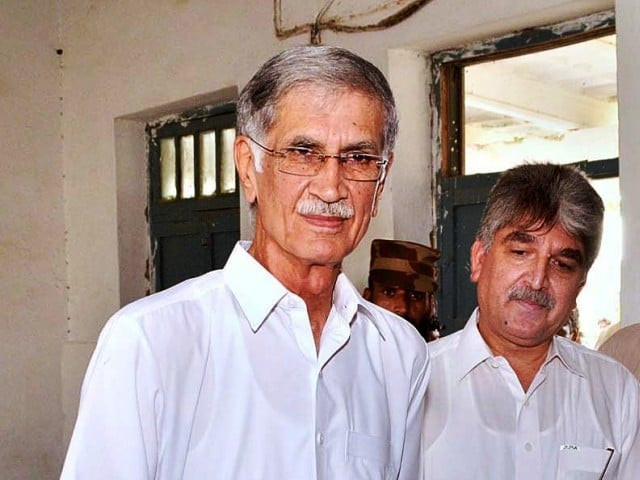Pervez Khattak: The new face of defence ministry
Khattak has been a member of the K-P Provincial Assembly five times

Former Khyber Pakhtunkhwa Chief Minister, Pervez Khattak. PHOTO:FILE
Khattak hails from Manki Sharif village in Nowshera district and received his early education from Aitchison College in Lahore, following which he completed his undergraduate degree at Gordon College, Rawalpindi.
The 68-year-old has served as the Chief Minister of Khyber Pakhtunkhwa (between 2013 and 2018), irrigation minister of the province and twice as minister of industries and labour. Before joining PTI, he was a political worker for the Pakistan Peoples Party.
In 1983 he began his political career as a member of the district council and has been a member of the K-P Provincial Assembly five times. In the July 25 polls he won from NA-25 and PK-64.
Pervez Khattak tenders apology to ECP in foul language case
During his tenure as chief minsiter, Khattak was accused of misusing development funds. He oversaw the design and construction of the Peshawar Bus Rapid Transit which faced numerous delays and has yet to be inaugurated despite a proposed date of April 2018.
In July, the National Accountability Bureau (NAB) opened an investigation into the project. No feasibility report was prepared before the project began and it was contracted to a company that had been blacklisted by the Punjab government.
“The delay, the contract awarding process, feasibility and other issues related to the project of BRT are shady and shaky,” Chief Justice PHC Waqar Ahmad Seth said in a written order.
Khattak, in his asset and liability forms — filed with his candidacy papers, stated that he had completed a number of development projects for the betterment of the people of the province, including construction of schools.
Khattak, Said accused of spending millions in ‘home’ constituencies
The Annual Statistical Report of Government Schools 2017-18, revealed that the government had built four primary schools in the city, two each for boys and girls. It was accompanied by a single middle school over the past year.
He failed to build even a single high or higher secondary school in the area in the past year.
However, over the course of his five-year tenure at the helm of the provincial government, his home district saw 27 new primary schools being built. While additional middle or high schools were not built from scratch, the government did upgrade 46 primary schools to the middle, and 40 middle schools to high schools. A further 26 high schools were upgraded to higher secondary schools.
Further, district rankings by the K-P Elementary and Secondary Education Department placed Nowshera on number seven for the availability of basic facilities in schools.













COMMENTS
Comments are moderated and generally will be posted if they are on-topic and not abusive.
For more information, please see our Comments FAQ